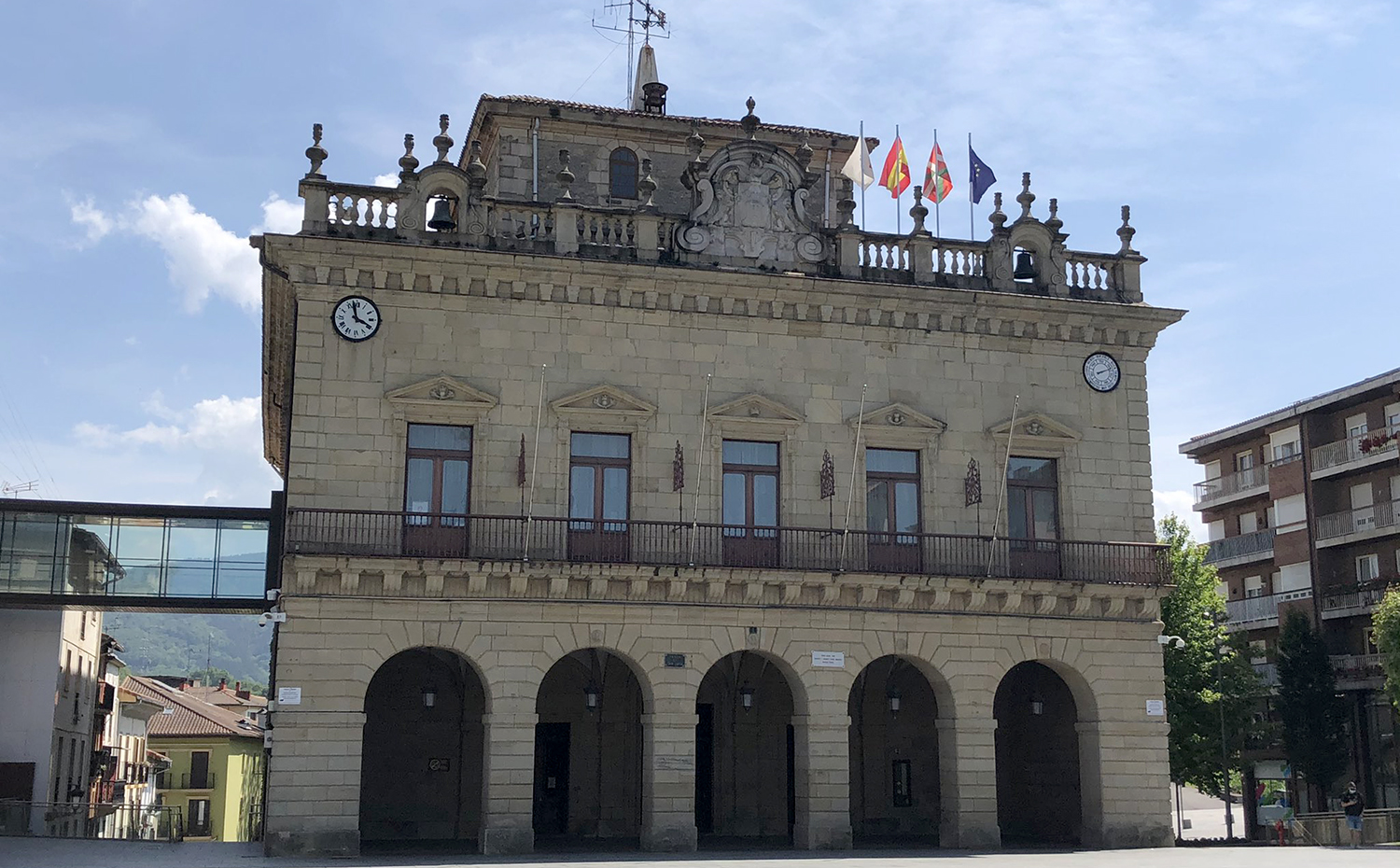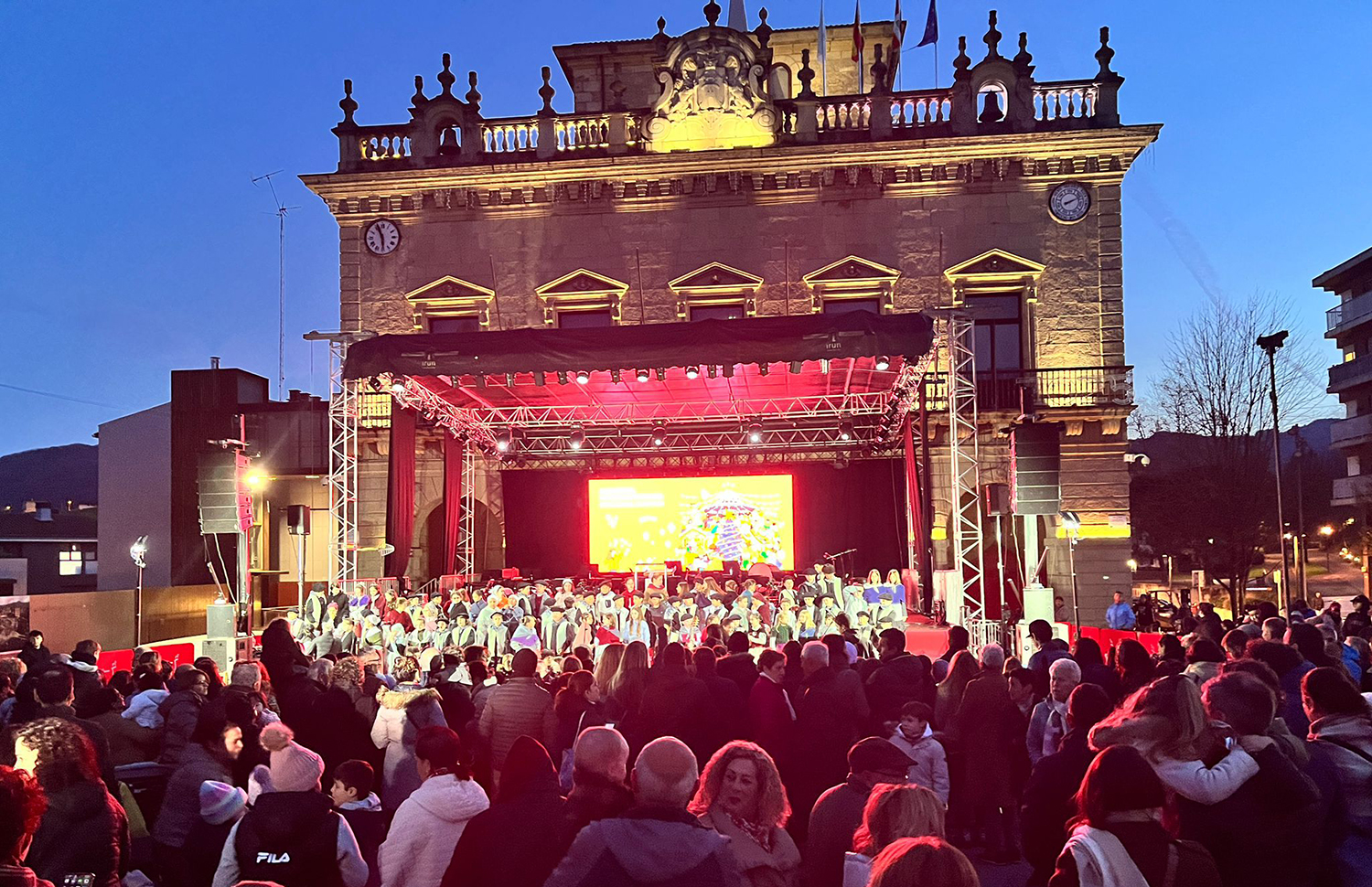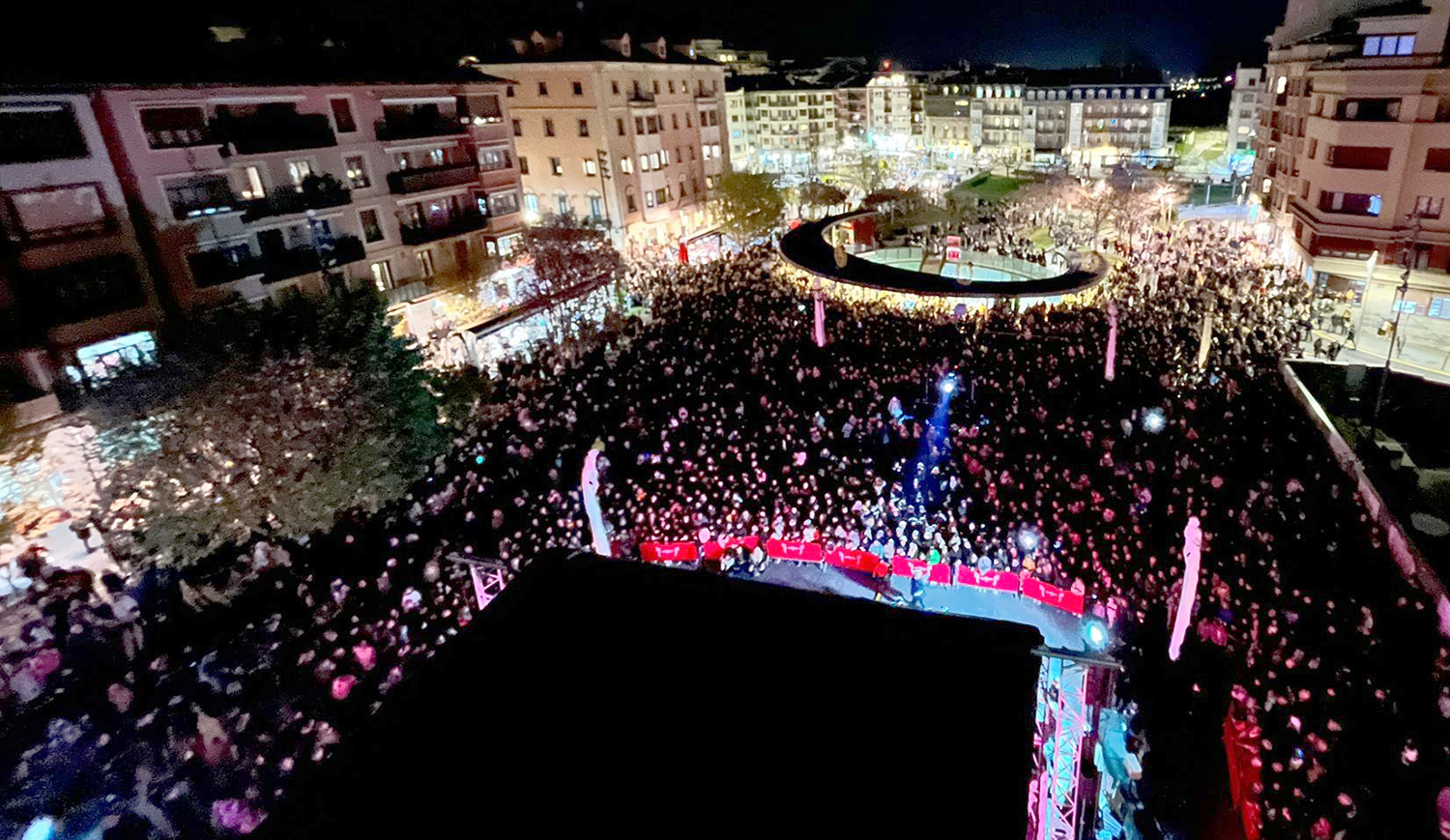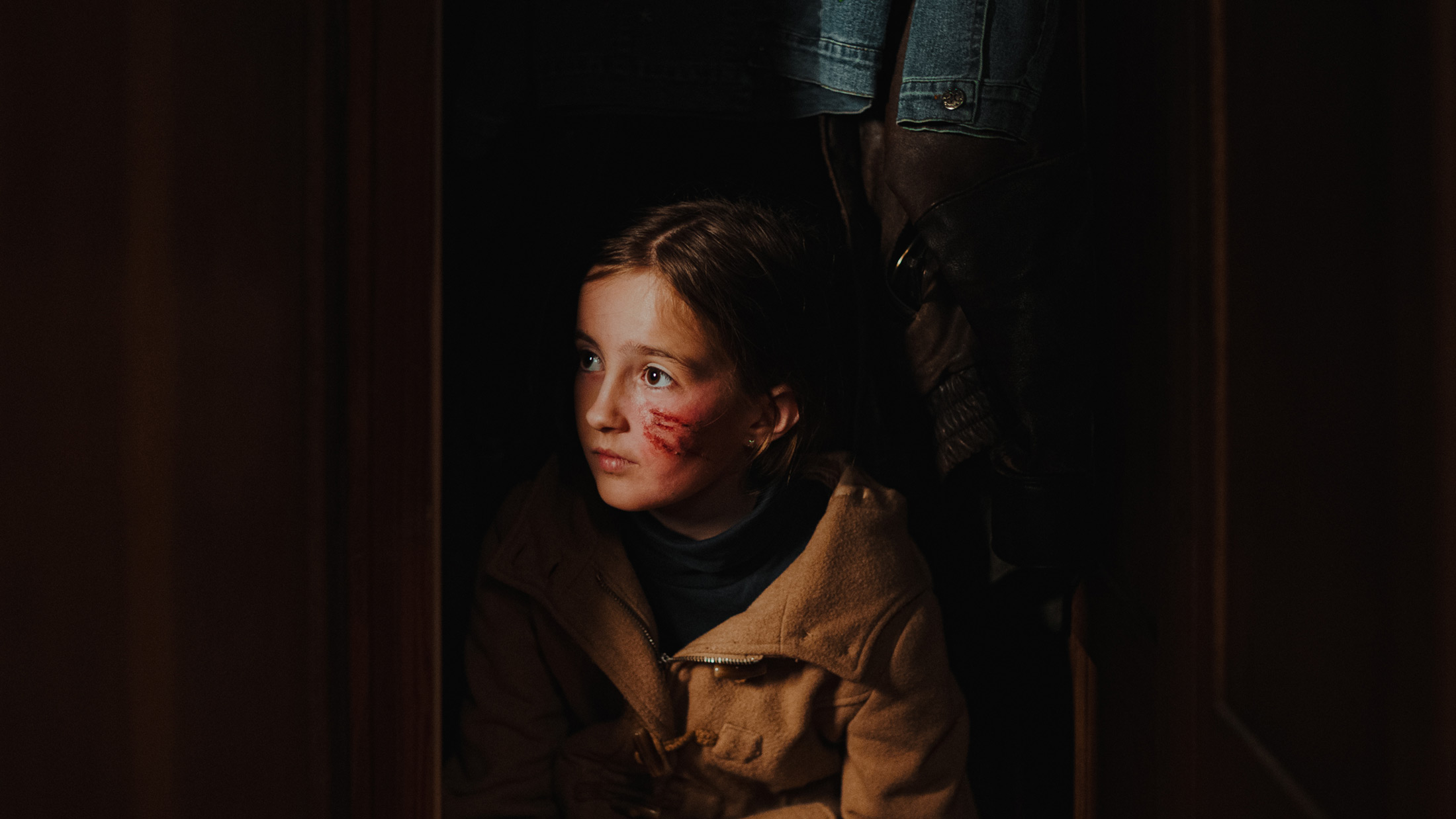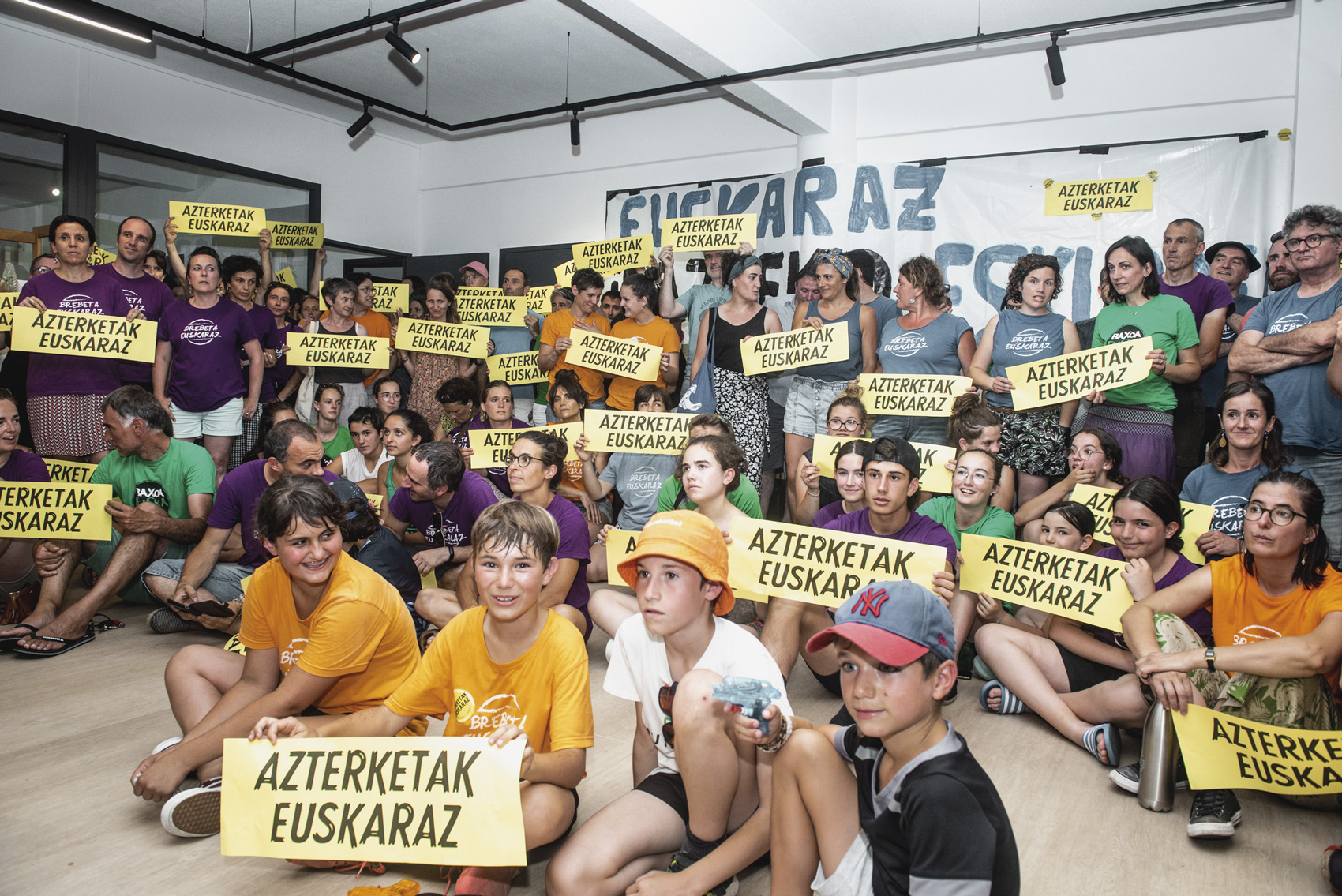Blow on the table to replenish air
- Something is moving at the centre of Basque cultural activity. Many Euskaltzales are concerned. It's cyclical. Now that a new political time is being opened in Euskal Herria, is the struggle for the Basque country running out? How can we get the Basque Country out of this impasse and make a great leap towards the normalization of the Basque Country?
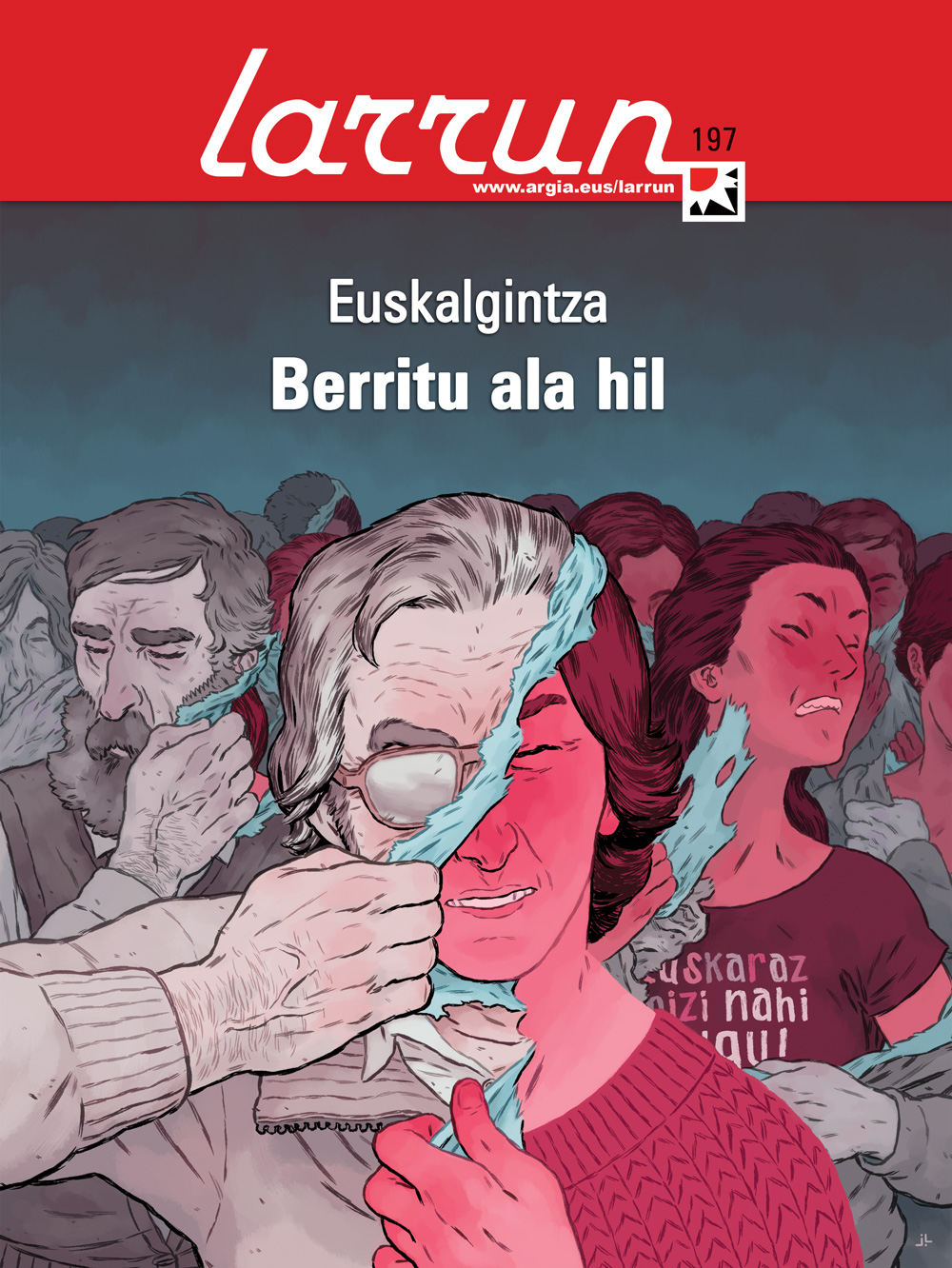
The world is moving at a dizzying rate and the keys have changed. It seems that the time has come to change old speeches and behaviour. Many believe that there are conditions for taking qualitative steps. Continuing to expand knowledge means putting forces in use. This requires an attractive speech and a political will. Will in all areas of society.
In addition to making a brief diagnosis of the situation, we've looked forward at this Larrun. We have talked to people from the Basque world, such as Koldo Izagirre, Lorea Agirre, Kike Amonarriz and Miren Amuriza. In addition, we have tried to gather the ideas that have been published by several Euskaltzales on one and the other occasion, informing the reader in advance that the reflections of many interesting people have been left out.
In general, the idea is clear: it's time to collectively empower and take a step forward.
*****
"Please remove Artze's note, it's useless and you have to change the message: 'A language is lost when those who do not know it do not learn.' A Catalan who has been in Urepel. Thank you very much. On the wooden wall they have placed a piece of paper with chinchetas, a handwritten note. The Navarro Gaizka Aranguren has hung the photo to the net while Korrika continues to spread throughout Euskal Herria the claim of Euskahaldapen.
A few days later, before thousands of people in Bilbao, Jakin’s director, Lorea Agirre, will read a secret message that has been wrapped up in her hands. It has offered a profound and resounding manifesto to Basque cultural activity. Start with:
The issue has not been or
has not been. This is not the case.
It's about acting.
Preparation.
We are what we do.
Being is doing.
“I was very aware that the channel was going to be an important message because it was important, and I wanted to write a manifesto, I wanted to make a contribution.” Agirre welcomes us at Jakin's office. In his words, over the past 20 years Basque cultural activity has been taking steps in this direction. “I had the basis: it is a political problem, a problem of coexistence, we ask for social justice. These are not new things. In 1967, Joxe Azurmendi wrote, although they are now coming out again.”

An earthquake in Basque?
“It’s time to shake off old inertia.” The socio-linguistic and television host Kike Amonarriz makes it clear: The schemes of Basque cultural activity are based on the 1970s and 1980s, although the situation has changed dramatically. “It’s time to make a leap forward.”
“These are times of regeneration – says the professor at Idurre Eskisabel University in the column she wrote in Berria on April 2 – of removing the Basque Country from the burden of essence and of understanding that the Basque Country gives us a vision of small, different and varied, not only of ourselves, but also of making the world more fun, more just and more democratic.”
“I think we’re at a turning point.” Bertsolari Miren Amuriza thinks that the discourse that has been used for years is exhausted: “It is no longer worth saying that our treasure is the oldest language in the world, let alone that the Basques always present themselves as victims or survivors.”
The journalist from the radio Euskalerria of Pamplona Juan Kruz Lakasta has written a column saying that it is time to leave behind the old politics in Berria (language). “[Podemos Euskadi] has analyzed the strengths and weaknesses of the Spanish left and, based on this diagnosis, has built new subjects and political discourses of hegemonic capacity, delving into the weak aspects of the old tools and discourses, the chargers, the attractions and the new ones. It's a smart exercise. In my opinion, Euskalgintza needs such an exercise.”
ARGIA journalist Gorka Bereziartua has addressed the same issue in the main article of the Linguistic Democracy campaign in 2014. “To reset an operating system that was neither in front of nor behind can be a good opportunity to change the correlations of strength and for the themes that were outside the main discourse to take on another leading role. We must be able to take advantage of the moment. And the time is now. Today better than tomorrow. Yesterday better than today. Are we taking advantage of the opportunities that we want to live in Euskera? I guess not. And that's not new either."
“Some changes are being made and it is seen that it is in a crisis point,” said Lorea Agirre, that this feeling can come very well to the movement that works in the normalization of the Basque country in search of new arguments. “Why are we going to remain Basque? Great answers and theories are over. Doing, doing, committing, pausing, doing, committing, pausing, committing and making sense, that is the way”.
To the Irish model or linguistic standardisation
According to Kike Amonarriz, we are at the end of one stage and at the beginning of another. “These are historical processes, and the time that began with the creation of the unified Basque Country, the institutionalization of the Basque Country and social recognition is over.”
The generation of over .jpg) 50 years has seen the birth or development of: Euskera batua, movement of ikastolas, diffusion of model D in the educational network, EiTB, institutionalization of the Basque Country, services of the Basque Country, movement for the Basque Country, EHE, associations of the Basque Country, adult literacy...
50 years has seen the birth or development of: Euskera batua, movement of ikastolas, diffusion of model D in the educational network, EiTB, institutionalization of the Basque Country, services of the Basque Country, movement for the Basque Country, EHE, associations of the Basque Country, adult literacy...
Look at Amuriza is aware that his generation has received a lot. “From Franco they were built, built and built for many years and it seemed that everything that had to be built was built. Now the work of our generation is different: on the one hand we have to renovate the buildings, change the decor, put more doors and windows and maybe even knock down some wall… disbuild”. In his view, new spaces should also continue to be created. “We have received a lot, but I think we have to do the same.”
Euskera and Bertsolari technician Manex Agirre has published an article on Euskera in Álava in the issue 205 January-February of Jakin magazine. In his words, in Álava, new routes of transmission have been opened with the new generation of people affected by this disease. The time has come for those who have received an Euskaldun education to be fathers and mothers, and that, unlike ten years ago, creates opportunities to transmit Euskera through the family.
Amonarriz stresses that people who today are around 30 years old are “in another key”. It has been born with previous achievements, so if it does not take a qualitative step forward it sees a risk of regression, “not only in use, but also in attitude and motivation”. For this socio-linguist, in the next generation, in the next two decades, “we are either taking the path to Ireland or taking the path of Europe’s standard languages.”
Power relations between languages
“If the Basque is insurgent, he will suffer his own language. Language problems are the linguistic aspect of social problems,” said Izagirre in Autopsy Tests. “This has been the case in the monarchy, in the republic, in the dictatorship and in this long post-Francoism. The territories we have in political autonomy have no sovereignty, so the Basque language is a tolerated language. The conflict experienced by the Basque Country is, to put it another way, the translation of another conflict: It is judged by Madrid, it is regulated by Madrid, Madrid… that is, Castilian spy all the movements of the Basque country. Linguistic subordination is the reflection of political subordination”.
Every language has its power. Each language has its linguistic and cultural capital. It is observed whether each language is in or under the hegemony. “It has to be made clear, they are fighting,” says Lorea Agirre in reference to the theory of linguistic ecology.
“Every language has political and economic capital, every language has the power to place you in society in one place or another. Translations, it has become apparent in the European Parliament that people who have English as their mother tongue speak from a position of power with regard to people who have had to learn this language. That is power.”
All policies in favour of the minority language, such as the hegemony of that language, the creation of respiratory centers or the development of immersion models, such as the extraction of the great language from some fields, is proven to be very good for the minority, according to Agirre. “We know that it is good for all languages and that for the great it is no harm. It doesn't mean anything. Helping the small is good for everyone.”
In the opinion of Lorea Agirre, when talking about Euskera we should not forget that we are talking about social injustice. That is why we cannot ask for the same treatment for all languages.
.jpg)
It has been documented that in the past few centuries the Spanish and French governments have applied language policies against the Basque Country, even forbidding the Basque country entirely under Franco. In the photo, the burning of books in 1936. (Ed. : Basque Report)
Need for a change of attitude
Look at Amuriza considered that the main challenge is for people to do so in Basque. “In recent times there is much listening and I agree, for example, with the idea of empowerment; we have to put aside victimization and strengthen it, be optimistic.”
The vasco-speaker as a speaker is a minority as a person and as a collective. Agirre also relates the approach to feminism: “We are owed social justice, equality policies, but that’s owed to us many times means nothing. What do we have to do to achieve this? Feminism has taught us: women are owed a thousand things, but they will not be given if they do not position themselves in the public square, with environmentalism, with immigrants, with the conditions of the workers. How are we going to fight for social justice? Even if we are a minority, will we become hegemonic, central, or an important debate, or conditioning?”
“We need a change of attitude.” Amonarriz thinks so too. “The Basque country has to be more central, we need more involvement. With this leap we must ensure that the next generation has linguistic rights guaranteed, that the social reproduction of the language is guaranteed, that its use is increased, although we know that we have decades left for the Basque language to be the most widely used language of Euskal Herria”.
Amonarriz argues that in the Basque Country the Basque language is used and necessary to live. Yes, mandatory. “If the goal is to make the leap from the survival of the Basque Country to normalization, then we have to take some risks and we have to assume the obligation. To guarantee linguistic rights, to guarantee their use, to make Basque compulsory in the main areas. Especially in the administration and in the centers of power”.
Reducing the discourse on taxation
Koldo Izagirre is concerned about the issue. In 2010 he published with the editorial Susa the book “Autopsiarako Probak, artseniko Arrastak seguro hizkuntza”, demonstrating that they have tried to eradicate the Basque language in Spain and France, and denouncing that today some political sectors continue to hinder any step towards linguistic normalization.
“It had a great accumulation, a tumor: that the Basque was imposed; that the goal was to be a good medicine, not a Basque medicine; that English should be learned from childhood; that physics and mathematics should be strengthened in the school; that the Basque country must attract… and before that, not to mention impotence, lack of response, dispersion and, in general, weeping. Finally I said, I worked hard on a demonstration of insults and exclusions. This is how this book came about.”
To the question of how he sees the situation, he answers: “We have impositions led by a group of theorists and politicians who disseminate dogmas. Ideological impositions first: Blanca Urgell said from the chair that he gave him his political status that he is also one of those who have no interest in that language. You will soon tell me that my Basque is not a production of the history of those who have spoken in Basque.”
Lorea Agirre is angry to hear the words “euskara” and “imposes” in the same sentence. “It’s absurd, but they’ve led us to equate Euskera with taxation.” “You cannot put the choice of Euskera and individual freedoms at the forefront, that is a trap that makes us the world of Castilian, our answer must be no; that discourse must be destroyed.”
“It has to be said: No, the Basque country, individual rights and taxation are not on the same footing, they are not married at all. And if you want to put them on the same plane, it is the opposite: Castilian or French is the only hegemonic language and our rights, linguistic rights, social rights; it is the great languages that are imposed here, I know the two languages, I can speak in you, you in mine?”
“This discourse must be disassembled.” For Amonarriz, this is not an argument used only in the Basque Country, but the imposition on the groups working in Wales, Catalonia and linguistic standardization is immediately reproached. “In the face of the Castilian speakers, the discourse that the Basque country imposes needs to be clarified and faced”.
According to Amonarriz, the Basque Country must combine social adherence and obligation to advance the process of normalizing the language. Considering the rhythms, the approaches in Gipuzkoa, Lapurdi or Araba are different. This is where social political logics come in, but “steps must be taken, whatever the scope”.
“We cannot continue with the scheme of 30 years ago, without taking into account that the majority of the generation leaving education is Euskaldun and well prepared, that in many areas the knowledge of the Basque Country is universalized. Therefore, the offers aimed at children and young people can only be in Basque. The same thing in the world of work. If not, why are we preparing an entire generation in Euskera? These keys introduce the concept of obligation, which has nothing to do with taxation. As Sociolinguist Aracil says: Renfe’s travel cards are not imposed, handed over by hand.”
For Amonarriz, the key is to turn the Basque Country into an exciting and cohesive project. “This is evident in the geographical and social areas in which the Basque Country is in the most difficult situations. But that has to be activated, and that has to do with the speeches that are being used. There we are missing and we have to shake the inertia”.
The Bilingual Trap
Koldo Izagirre is very attentive to the model of bilingualism. “The demand for bilingualism aimed to include Euskera in prohibited areas, especially at school. But the application of this bilingualism has imposed Castilian in the few areas that the Basque country could have: nothing is democratic if it is done only in Basque, it has to live from the hand of Castilian”.
“De Fakto, a great mass produced in Basque, is the translation of Spanish. In no case does it translate into Spanish anything generated in organizations. The situation of the Basque Country, at the political level, is a statutory failure,” says the Passover writer.
Kike Amonarriz, for his part, sees a need to overcome the debate on bilingualism in the Basque Country. “At the institutional level, we cannot believe in symmetrical bilingualism. For Euskera to achieve normalization here, Euskera needs respiratory spaces. This concept is very important. The survival of any language requires specific functions which are only developed in it and which are increasingly numerous. For example, the use of the Basque language should be the main language in the geographical area represented by UEMA, an almost unique area of official use. Euskera needs its own and exclusive communication spaces, activities that will be developed exclusively in Euskera by municipalities. The Basque language has to be a single or predominant language in the cultural and leisure offer for children and young people, and the Basque language has to be a predominant language in the internal functioning in certain areas of work. That makes it compulsory. This makes it functional. And so it becomes attractive.”
What are the challenges of Euskera?
.jpg) Look at Amuriza thinks that the main challenge is for people to express themselves in Basque. The issue is that the Basque Country is associated with formality and, at the same time, with correction, and that considers that one of the main reasons is the school. “In schools we have been learning verbal tables for years, rewriting and receiving writings in Basque filled with red circles. I believe that the Basque language, like any other language, should be related to communication in general: to formal and informal records, to science and to humor…”.
Look at Amuriza thinks that the main challenge is for people to express themselves in Basque. The issue is that the Basque Country is associated with formality and, at the same time, with correction, and that considers that one of the main reasons is the school. “In schools we have been learning verbal tables for years, rewriting and receiving writings in Basque filled with red circles. I believe that the Basque language, like any other language, should be related to communication in general: to formal and informal records, to science and to humor…”.
Kike Amonarriz states that an adaptation is needed in the social discourses on the Basque country. On the one hand, how can Euskera be disseminated to those sectors that claim to be favorable to Euskera, but that do not in practice in Euskera. In addition, we must work on how the next generation of people who do not have a favourable attitude will be euskaldunized.
Asked how he sees Basque cultural activity today, Koldo Izagirre says: “regulated and institutionalized: domesticated”.
Lorea Agirre brings to the language an idea from feminist Marcela Lagarde: “We are negotiating the minority level of the language, as far as we are going to stay.” In his opinion, sometimes the problem has to be discussed in order to make it visible. “Here’s a problem, vasco-speakers can’t breathe, sometimes you have to say.”
“We’ve smiled many times and we’re going to do it, but sometimes we have to hit the table. We talk about social justice, the north is normalization.”
Look at Amuriza sees a lack of cohesion in the Basque world: “In a broad sector there is a will to change; new messages, different attitudes, a desire to collaborate… But many times we look at the Basque world from a very limited perspective. It is all very well that AEK, the associations of the Basque people, Ikastolak, Berria, Argia... for example, seek new winds. But where do your roads coincide, for example, with those of ETB or Euskaltzaindia? We need a new speech and the temporary absence can be positive, a sign that we are moving. However, the lack of cohesion is a serious problem.”
New speech
The classroom of gaztetxe Putzuzuzuzulo de Zarautz has been filled to the neck to hear a round table on feminism and vasquism. Led by Samara Velte, Lorea Agirre, IDURRE Eskisabel and Onintza Irureta will reflect for an hour and a half on the most relevant themes of the day. The combination of these two struggles is of interest.
“Feminism has built the discourse from justice, Vasquism not yet”, “Euskalgintza has the need to renew the burden and thought of tiredness”, “we have to politicize the issue of Euskera, get it out of politics and bring it to the field of rights”, “I do it in Euskera because I want you in my group; not because I want you out of my group”, “try to demonstrate rights”.
People are following the issue carefully. There has been talk of various oppressions. Later, Agirre will leave the message “And shake hands with other means of empowerment that we have sisters/What doesn’t move doesn’t feel the chains” in the hands of thousands of people.
In his office in Jakin, Agirre relates Euskera with the struggle for a better world, and sets as an example the ikastolas. “The ikastolas were created in Franco, yes, but with the most advanced pedagogy. That's why they succeeded. Where do you want to send your children to a Francoist school or an open Basque school? If they were a copy of Franco's schools, they were surely over. We need to bring this concept to all areas. We have to offer that plus always in Euskera, we need an exciting project.”
In Álava, for example, the struggle for the Basque Country has a stain of social claim. “In a suffocating Vitoria, one more way to oppose power was to use the Basque. Not so much from the point of view of identity, or from Orthodox nationalism”. Manex Agirre reported in Jakin that “this under-used feature in other areas has taken its course in our environment, although it has not had a massive impact on society. This is borne out by the radio Hala Bedi, the gaztetxe of Vitoria-Gasteiz or other movements that have participated in the counter-war.”
In Ipar Euskal Herria, the members of the Euskal Herria Zuzenean festival are observed, for example, the same spirit. They relate Euskera to community work, cultural diversity, the fight against discrimination, the protection of the environment, ethical consumption and leisure, among others.
“The Basque Country is our only free territory,” said Joseba Sarrionandia. For the mining area, from Trapagaran, the young Kimetz Arana understands Euskera as “an immense alternative to uniformizing global culture”. “Euskera, rather than language, is the main characteristic of a culture, with its worldview, literature, humor, songs and stories.”
He has written on the ARGIA blog “Meatzaldeko Mundua” with the excuse of Korrika. In his opinion, “in the identity crisis generated by the current commercial society, the Basque Country can allow us to develop a vision of its own open to the world, to know who we are and to feel ourselves”. According to Arana, collectivity and identity are the strongest characteristics of the Basque for the future.
“Zira Euskalduna? The one who's taken you on the auto-stop asking doesn't mean that you lived in Bidart, nor that your grandmother was called Urzurigaray, so you smoke net. It simply means: How do you speak, in Basque or in French? Other definitions are ethnicists.” Antton Lukuk Basque culture? The book asks whether there are peoples in the world who have such an open self-definition. “You learn Euskera, ziup, you’re automatically Euskaldun zira, welcome to the club and point.”
The Basque struggle can also be related to the environmentalist attitude. On the High-Speed Train, the territorial organization and the Basque Country, Luis Manjón has brought together Euskera and environmentalism. In his opinion, “there is a very close relationship between the survival of the Basque Country and the natural environment”. According to him, “the Basque country needs an environment, an environment, a development model that, precisely, helps to breathe the natural environment to survive.”
.jpg)
To be Euskaldun is to use Euskera
“He is the one who uses the Basque language,” said the Bagara message nor written in the witness of Korrika. Asked what I meant by that, Agirre says:
“On the one hand, knowledge of language is not enough and use marks the future, so the Basque being is its use. On the other hand, we have to remove the term Euskaldunberri once and for all, because they are Euskaldunes, because we are full of illiterate Euskaldunes Euskaldunzaharras, who supposedly speak very well Euskera, but then do not use it. The third one will save her use, and as the language lives, the speaker will give her life. It refers to the Chilean phrase “The land is of whom it works”, by Victor Jara.
The experience of the last decades has shown that Euskaldun education, even if it is the basis, does not guarantee its use. How to promote use?
“Six to sixteen years old, every day we heard that we had to speak in Basque and that the verbs had to be played without any defect,” Miren Amuriza said. “Many stopped speaking in Basque at the same school time, because of disobedience to order, because it bothered them… At the age of making a conscious selection, most follow the stream and listen to music in Spanish, sing goals in Spanish, potea in Spanish, watch movies and series in Spanish… Among my classmates, they all learned in Basque the mother tongue. Today, how many of 25 will we be living in Euskera? About five ...”
Amuriza defends that the way of teaching Euskera in schools must be radically changed; that we must move from the grammatical to the communicative perspective. That boys and girls should be trained in Euskera to practice any type of record and textual genre, and that the written should be given as much or more importance. “First you have to realize that the Basque language is as useful as any other language and, if it comes, then the awareness will come, not saying that they will lose a treasure if they do not in Basque, but making them feel how much they will earn if they do it in Basque. Always positive.”
According to Koldo Izagirre, seduction must be preceded by consciousness. “All languages have the force of seduction: Japanese have that beautiful writing, Euskera has its sonority, and that system of concrete verbs, nothing irregular, easy to learn, has a transparent and soft pronunciation… But Castilian first needs a conscience to approach those values.” Seduction, at least in languages, occurs gradually, when it begins to appropriate the interior. In Izagirre’s view, languages can no longer seduce anyone except when they begin to learn. “In addition, there is another seduction that arises from a culture. “The Basque cannot have the value of Castilian or French in the linguistic bag, it is a poor “capital”. And there is the problem, which gives us fear to say that the Basque is used to be different, that the Basque gives citizenship. Before we learned Basque to be Euskaldunes, today we learn to know Basque”.
Kimetz Arana goes the same way: “As for Trapagaran, we are increasingly Euskaldunes in the town. We'll have to interact to make use of language and gain spaces. Thus, to the extent that we use the Basque language more, we will create our own Basque identity, that of Meatzaldea, of diverse origin, of mixed origin, of miners, of workers and of the street, and our activity will be naturalized integrated into the people”.
In their words, it is up to the new generations of the Valle de Trapagan to address, reflect, respond to the new needs, unite and advance in the use of the Basque Country. Thanks to what the previous ones have done, they are Euskaldunes and now it is possible to live in Basque in Trapagaran. “Do not choke us in global culture, so that today’s tide does not become the drop of tomorrow’s sea, so that Korrika is not a biannual folklore.”
Euskera is a political choice
“I have the impression that in crews, in couples, in institutions, in workplaces, there is a lot of talk about Euskera at a general level, and that there is not so much talk about languages of relationship between people.” Kike Amonarriz believes that the issue should be explained. In his opinion, although the leap from one linguistic custom to another in the beginning is difficult, it is possible to manage and gain relations for the Basque Country, but for that we have to talk about the issue.
“The situation is going to get worse, I find it increasingly difficult to bring people to Euskera in the talks.” “It is very difficult to establish Euskera as a group language and as a group language.” “We lack the right language, the living language, in the hika, for example, there has been a cut,” “We have to be sure that although we sometimes lack that freshness when speaking in Euskera, we will take it to ourselves”.
These reflections and many more have been taken out in a video by a group of young people from Elorrio. In the city, 94.3% of the young people know Euskera, but 28.3% speak it and, in addition, the figure falls. They've put a lot of young people talking about it with three questions. What is the Basque for you? How do you see use among young people? What will be the situation of the Basque people in Elorrio? At least, in relation to the video, some commentators would think about it.
Look at Amuriza doesn't see in that scheme parties, institutions, associations. “Although it seems like a contradiction, I believe that one of the ways to give centrality to the Basque country is the strengthening transversally in all areas, as is being done with feminism: in culture, in education, in the media, in the popular movement, in associations and at the political level. We need to compromise all areas and creativity, especially creativity...”.
Lorea Agirre, for his part, has chosen the Basque for the occasion. “It’s not hegemony, it’s not normal, it asks for reflection, what I’m going to choose now... that means that if you don’t have the oxygen being spoken in Basque in your environment, you have to make conscious choices continuously.”
That is why, in his view, effective language policies are needed to generate that oxygen, not to have a constant choice and to create the breathing centers. “Language policies may be general, but at the same time very specific, very local, very age-oriented...”
He argues that these linguistic policies should be designed with the involvement of society: institutions, associations, agents of the labor world, municipalities, speakers... “Today things have to be like this: these policies have to be participatory, that means that material and economic resources must be made available to those who decide; we will no longer deceive anyone by saying that they have to do this or the other, we decide here what to do.”
In his view, in order to promote use, socio-linguistic conditions must be changed and awareness must be worked out. “In our case, we should inform each person that every action we do is a political action, which has its influence. Don't you care? Well, you don’t care, but you already know.”
In Amonarriz's words, if languages had to be classified in some way, there are about fifteen giants in the world, then state languages, then Catalan as an isolated case, and then minority languages and with a significant number of speakers who are not state languages. “In his head are us and we are seen by the Occitans, the Bretons, the Amazigh, the Kurds, the main indigenous linguistic communities of South America...” This is corroborated by the emotional documentary Beltzean, produced by Garabide. In it, the members of the minority languages of South America present the Euskaltzale movement as an unseen relative and take the process of normalization of the Basque Country as a model.
In Amonarriz’s opinion, if the Basque movement takes steps forward, it will remain a benchmark, a source of motivation, a source of strength for all the linguistic communities of the world. And if the Basque country fails, it wouldn't do it alone. “In this sense, we have a historical responsibility. Conduct a standardisation process based on justice. It’s one of the biggest contributions we can make to the world.”
Gabonetako argiak pizteko ekitaldia espainolez egin izanak, Irungo euskaldunak haserretzeaz harago, Aski Da! mugimendua abiatu zuen: herriko 40 elkarteren indarrak batuta, Irungo udal gobernuarekin bildu dira orain, alkatea eta Euskara zinegotzia tarteko, herriko eragileak... [+]









